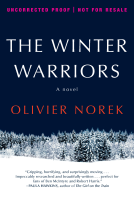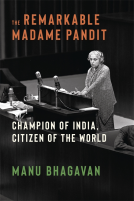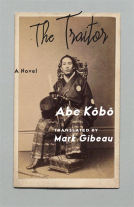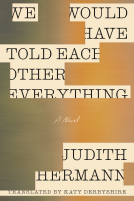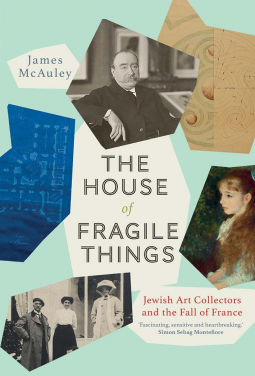
The House of Fragile Things
Jewish Art Collectors and the Fall of France
by James McAuley
This title was previously available on NetGalley and is now archived.
Send NetGalley books directly to your Kindle or Kindle app
1
To read on a Kindle or Kindle app, please add kindle@netgalley.com as an approved email address to receive files in your Amazon account. Click here for step-by-step instructions.
2
Also find your Kindle email address within your Amazon account, and enter it here.
Pub Date May 11 2021 | Archive Date Mar 23 2021
Yale University Press, London | Yale University Press
Talking about this book? Use #TheHouseofFragileThings #NetGalley. More hashtag tips!
Description
“The depths of French anti-Semitism is the stunning subject that Mr. McAuley lays bare. . . . [He] tells this haunting saga in eloquent detail. As French anti-Semitism rises once again today, the effect is nothing less than chilling.”—Diane Cole, Wall Street Journal
“Elegantly written and deeply moving. . . . [A] haunting book.”—David Bell, New York Review of Books
In the dramatic years between 1870 and the end of World War II, a number of prominent French Jews—pillars of an embattled community—invested their fortunes in France’s cultural artifacts, sacrificed their sons to the country’s army, and were ultimately rewarded by seeing their collections plundered and their families deported to Nazi concentration camps.
In this rich, evocative account, James McAuley explores the central role that art and material culture played in the assimilation and identity of French Jews in the fin de siècle. Weaving together narratives of various figures, some familiar from the works of Marcel Proust and the diaries of Jules and Edmond Goncourt—the Camondos, the Rothschilds, the Ephrussis, the Cahens d’Anvers—McAuley shows how Jewish art collectors contended with a powerful strain of anti-Semitism: they were often accused of “invading” France’s cultural patrimony. The collections these families left behind—many ultimately donated to the French state—were their response, tragic attempts to celebrate a nation that later betrayed them.
Advance Praise
‘A remarkable book. I’ve finished reading with a sense of wonder at the unknown world its author recreates for us, and with shock at how senselessly that world was destroyed.’
—Alice Kaplan, author of Looking for The Stranger: Albert Camus and the Life of a Literary Classic
‘Fascinating, sensitive and heartbreaking, deeply researched and elegantly written, filled with flamboyant dynasties of art collectors, McAuley guides us between the chic glamourous sophistication of the Paris art world and the murderous greed of the Nazis and their collaborators.’
—Simon Sebag Montefiore
"Beautifully written, astoundingly researched and penetrating in its gaze into an irrecoverable world, both Parisian, European and Jewish, James McAuley vividly revives a past now on the brink of escaping living memory. The House of Fragile Things is a book about art, France, the Holocaust and what it can mean to be a Jew, that will haunt you long after you have read it."
—Ben Judah, author of This is London
Available Editions
| EDITION | Other Format |
| ISBN | 9780300233377 |
| PRICE | $30.00 (USD) |
| PAGES | 320 |
Average rating from 4 members
Featured Reviews
 Reviewer 703837
Reviewer 703837
This is a study of Jewish antique/art collectors in France from around 1870 to 1939. Mostly, the focus was on stories: a series of individual biographies in the first half and the shared destinies in the second half.
There are a couple of chapters on the interlinked families of Cahen d’Anvers and Camondo (chs.3-4), one on the scholarly Reinachs (ch.5), and the Ephrussi and Rothschild families (ch.6). Each chapter is nominally focused through a ‘collector’ but the art aspect is soft-pedalled and the treatment is more biographical. The content broadly seems to follow the archive holdings of each family’s letters and photos, which ensured it stay all a bit more up-close and personal. It is left to the last few chapters (ch.7) to begin to expand on the main themes and bring them together - which does happen and is done very well.
It had a more gentle and accessible feel that I expected from an academic imprint. Although the footnotes show how much study went into this the tone was consistently patient and particular even in the second half of the book when the personal, cultural and historical aspects all became more intense. The focus is appropriately on the subject matter more than what the author’s interpretation of his material. Even when there are some very good ideas in there (the Côte d’Azur as ‘dream scape’ analogous to Benjamin’s Parisian arcades) they are not belaboured or allowed to distract from the villas and social groups the idea is meant to illuminate.
It leans heavily, though not exclusively, on the Camondo family whose Museum in Paris is a fantastic place to visit (when the Covid lockdown is over!). It is the archives up in the attic of that Museum that provided many of the photographs and letters which give the book is personal feel. Edmund de Waal has a book out on Count Moïse Camondo at the end of April 2021, also drawing on the same archives, so I thought I would read this book for a bit of extra background. I suspect de Waal will focus quite a lot more on the art that was collected - in which case the books will complement each other very well.
Overall, It is a book with its own gentle charm that does get across (some of) the double bind through which even elite Jewish citizens, who had contributed to French life body and soul, still lived in a climate of barely suppressed hostility that could, and did, turn very nasty very quickly. The chapter about the internment of the various families (ch.8) was very moving, and the final chapter (ch.9) had a few surprises.
Readers who liked this book also liked:
Rachel Joyce
Historical Fiction, Literary Fiction, Women's Fiction
We Are Bookish
Biographies & Memoirs, Health, Mind & Body, Nonfiction (Adult)
